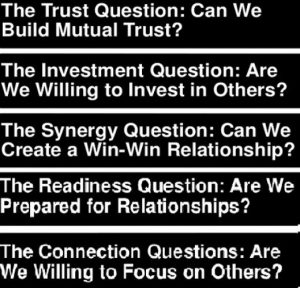Mutual Trust And Responsibility… Mutual trust is the mantra for success… and teams that have implicit trust in their leaders breeds success. It is believed that no battle is won alone… Briefly, one cannot expect to achieve success through solitude. Therefore, it is said that you tend to slip, if you work in a vacuum.
The leaders and the chiefs… are given their status and value only by the teams that support them. These are the teams that have… implicit trust and complete belief in their leaders. And these are the teams that the leader in turn… has complete faith. This is what leads to success. Hence, the values of mutual trust, belief, and confidence are… rare yet important qualities to embody. This would result in consistency… and interconnection. In short, an unit that works together, triumphs together.
Loss of mutual trust leads to insecurity.
However, today’s corporate business is filled with insecurity as employees are too competitive. As a result, the mutual trust is lost. Leaders project a negative image and are viewed upon like monarchs who tend to work behind closed doors. On the contrary, a leader has to resonate with trust, so that every worker is inspired. They must be willing to follow the leaders’ instruction, even in times of risk.
Mutual trust is not achieved alone, but us a shared concept.
Leaders have to not only generate employee trust in them but also show trust in the employee's abilities. Both the worker and leader need to have a mutual trust with each other.
A leader has to leave behind his ‘ I ’, his sense of authority and importance. To impart mutual trust, one needs to work as a team member and not always as a chief. Originality, innovation, and greater efficiency will result.
Efficient managers view everything from a “we” standpoint.
Management guru Peter Drucker mentions that the managers who work most efficiently, never say ‘I.’ This is NOT because they are mentally prepared not to say ‘I.’ But it is because, they don’t think ‘I.’ The focus is always on teamwork, and to always think ‘we.’ They have taught themselves to think ‘team’ and understand that their primary objective is team function. However, they don’t evade accountability, but instead accept it. However, they ensure that it is ‘‘WE’ who gets the recognition. This is what essentially creates trust, and what enables you to get the job done.
A leader must uphold his values even in times of difficulty.
Every leader resonates with the values that he upholds. To build confidence, one must remember their principles and values, even in times of difficulty. It is only then the leaders are looked up to, and trusted, and their credibility is not lost.
To sum it up, live by your values, work as hard as your head, falter with grace, and win with humility.
When given a rigid schedule, employees tend to only slip away. However, if they are trusted, their performance excels as well as their belief in the leader grows. Employees working within strict, non-flexible frameworks are bound to feel resentment towards the leadership and management.
A sense of involvement is very necessary. This can be generated when the employees form an integral part of the decision-making that relate to their work. Leaders often hold on to every important task and do not take inputs. On the contrary, leaders have to trust their workforce, and let go of what would lead to a much productive and better workforce.
The leader who plays favorites and does not treat all with respect will face difficulties. For a leader to be trusted he has to exude fairness and honesty. Rude behavior and an arrogant attitude, only depicts self-importance and lack of respect for others. Playing favorites results in loss of internal co-operation. However, a leader who treats everyone equally is looked up to. Reward the worker who excels, but never be unfair or unjust. Give everyone his or her due importance.
Trust is not created in an isolated position. Managers, leaders have to communicate clearly with their peers and subordinates for them to follow the leaders’ goals, paths and methods of functions. Secrecy only leads to hostility. Further, a leader has to always be honest in his communication especially when there is a problem.
Honesty, integrity, trust seems like virtues or even words of another era, not applicable to the current, rapid, transient and volatile corporate world. However, behind every story of permanent and repeated success is the principle of trust. The employee trust in the leadership and the leaders’ trust in their employees.
When you look back on your career, you should not view your career as one big obstacle race, with you being the chief obstacle. In other words, if your focus is always on yourself, you will never be able to build successful and positive relationships. So, always leave your ego at the door!
If a leader does not have the respect and trust of his employees , how is he supposed to construct the required connection that is essential to motivate them to accomplish greater heights?
Related Posts.
Best… 🙂
Follow Us on Social Media Below (We are a Real People :)):
Subscribe To Our YouTube Channel Here





Leave a Reply